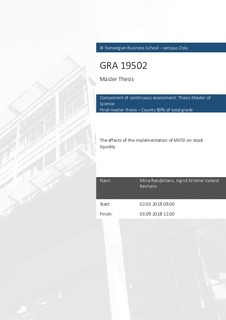The effects of the implementation of MiFID on stock liquidity
Master thesis
Permanent lenke
http://hdl.handle.net/11250/2578778Utgivelsesdato
2018Metadata
Vis full innførselSamlinger
- Master of Science [1621]
Sammendrag
The purpose of this thesis is to investigate the effect of the Markets in Financial
Instruments Directive (MiFID) on stock liquidity for the Norwegian equity
market. Our objective is to find out whether the implementation of MiFID has had
an effect on stock liquidity, and if it has, we seek to research whether this effect
has been positive (increased liquidity) or negative (decreased liquidity). MiFID
abolished the “concentration rule” and allowed for trading on alternative trading
venues, introducing market fragmentation in the Norwegian equity market. Our
research focuses on the OBX index, which includes the 25 most liquid stocks on
the Oslo Stock Exchange, in the period of 2006 - 2017. We employ the
methodology presented by Gresse (2011) where we utilize the panel regression
method to study the effects of competition and market fragmentation on stock
liquidity as measured by the bid – ask spread. In the regression we include trading
volume, stock price and return volatility as control variables, and use binary time
variables to study the effects of different levels of market fragmentation on
liquidity. We find that there is a significant effect of MiFID on stock liquidity.
Our results show a positive effect on stock liquidity following the introduction of
MiFID, as demonstrated by a decrease in bid-ask spreads.
Beskrivelse
Masteroppgave(MSc) in Master of Science in Business, Finance - Handelshøyskolen BI, 2018
